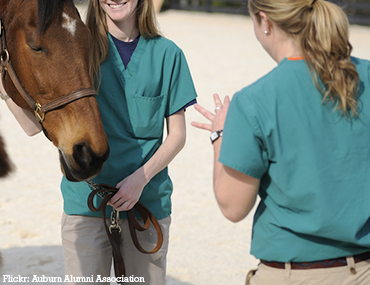
Dr. Justine Lee explains veterinary specialists. For more from Dr. Lee, find her on Facebook!
I often get asked what that “alphabet soup” behind my name is. More importantly, as a pet owner, why should you care?
Those extra letters behind a veterinarian’s name means that they are a veterinary specialist (e.g., Justine Lee, DVM, DACVECC, DABT). These letters stand for something – for me, it’s “Diplomate of the American College of Veterinary Emergency Critical Care” (DACVECC) and “Diplomate of the American Board of Toxicology” (DABT). So, what does that mean? It means we went through a whole lot of extra advanced training to become an elite expert in the field. (I’m extra-geeky and am double-boarded.)
In the United States, there are appropriately 90,000 veterinarians, with approximately 11,000 of them being specialists. So, what’s the difference between a veterinarian and a veterinary specialist? Veterinary specialists have advanced training beyond veterinary school – it’s someone who has gone on to complete secondary training through a rigorous internship and further training in a residency or fellowship (typically 2-4 additional years). In order to be board-certified following your residency, you have to publish a scientific research paper (in a peer-reviewed, scientific, accredited research journal) and pass an intense 2-3 day exam (similar to a lawyer’s bar exam). So, not easy at all!

Right now, there are numerous medically-related veterinary specialties including:
- Anesthesiology and Analgesia (DACVA)
- Behavior (DACVB)
- Cardiology (DACVIM – Cardiology)
- Dentistry (ADVC)
- Dermatology (DACVD)
- Emergency critical care (DAVECC)
- Internal medicine (DACVIM – Internal Medicine)
- Neurology (DACVIM – Neurology)
- Nutrition (ACVN)
- Ophthalmology (DAVCO)
- Pathology (DACVP)
- Radiology (DACVR)
- Surgery (DACVS)
- Wildlife/zoo medicine (DACZM)
- Veterinary Practitioners (DABVP)
That said, more recent “specialties” have been popping up, some less “rigorous” than others (e.g., some not even requiring additional training nor a publication). I worry about where this is going, so don’t be deceived when you see alphabet soup behind your veterinarian’s name. When in doubt, look for the initials starting with “American College" and ask your veterinarian for advice or how to find the best specialist who fits your needs… or more importantly, your pet’s needs.
For routine care, you’re in better hands with your family veterinarian (after all, I haven’t spayed anything in years!). However, if your pet is really sick, a veterinary specialist may be the best option for the care for your pet. Specialists typically see referral cases that may are more complicated or critically ill, or need advanced procedures performed that your veterinarian doesn’t routinely perform. For example, if your dog or cat requires advanced surgery (e.g., such as a total hip replacement) or an ultrasound of his heart, he may need to see a board-certified veterinary specialists in surgery or cardiology, respectively. If your pet is in advanced kidney failure, a consultation with an internal medicine specialist may be imperative. If your animal needs 24-hour care and is critically ill, he may need to be evaluated by an emergency critical care specialist. More information on specialists can be found on the AVMA American Board of Veterinary Specialties page, or specifically at the specialty's website.
If you have any questions or concerns, you should always visit or call your veterinarian – they are your best resource to ensure the health and well-being of your pets.
